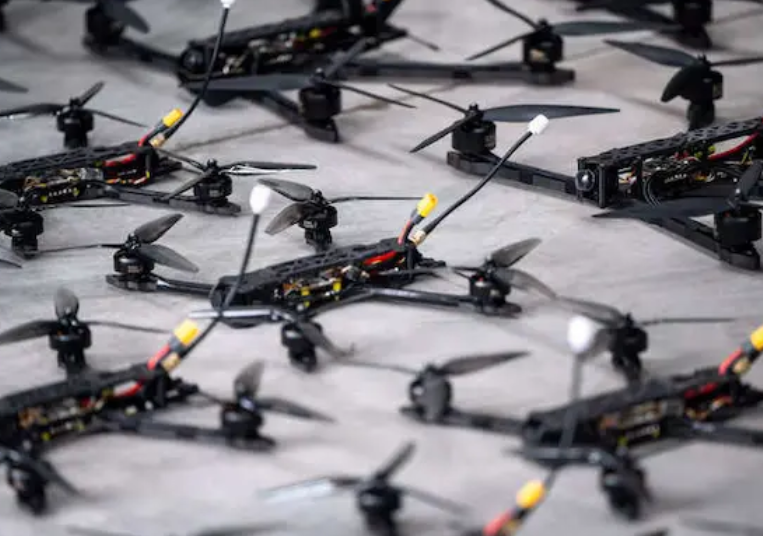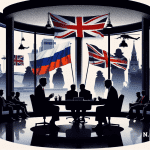In recent months, Ukraine has been making headlines with its innovative approaches to warfare, particularly with its use of drones. A significant change is on the horizon: Ukraine may soon no longer require pilots for its drone force. This shift towards autonomous and artificial intelligence (AI)-enabled systems is seen as a major development in the ongoing drone arms race between Ukraine and Russia.
The Rise of Autonomous Drone
According to sources, Ukraine’s drone units could transition to completely pilotless systems in the next six months. The leader of a special drone unit revealed that these drones would operate independently, deciding where to fly and how to hit targets without human intervention. The only action required from soldiers would be to launch the drones. Once airborne, the drones will use advanced AI technology to navigate, identify targets, and engage in combat.
Currently, several Ukrainian and Western companies are working on developing autonomous drone capabilities. Some of these drones have already been deployed on the battlefield and have successfully carried out autonomous strikes against enemy forces. However, many of the drones in active use still rely on human operators for control. The potential move to fully autonomous systems could drastically alter the landscape of modern warfare.
The AI technology being developed aims to enhance the effectiveness of drones. It allows them to distinguish between friendly and enemy forces. This capability is crucial for reducing the risk of friendly fire. It also ensures that drones can operate effectively in chaotic combat environments. As drones continue to evolve, their role in military operations becomes increasingly vital. This evolution leads to the development of new strategies and tactics in warfare.
The Importance of Drone Warfare Experience
Ukrainian soldiers have gained invaluable experience in utilizing unmanned systems during the ongoing conflict. This expertise positions them well to share knowledge and training with NATO militaries in the future. The commander of the special drone unit expressed that this sharing of knowledge will serve as a form of gratitude for the support received from Western partners during the war. This exchange of experience could lead to enhanced drone operations across various military forces, improving overall effectiveness on the battlefield.
As drones have become a defining element of the conflict, both Ukraine and Russia are actively engaged in a technological arms race. This race is characterized by the widespread use of unmanned systems and the development of countermeasures to neutralize threats. For instance, as first-person-view (FPV) drones emerged as a serious threat, both sides employed electronic warfare strategies to counter their effectiveness.
The introduction of tethered drones connects operators via fiber optic cables. This method helps counter jamming and other interference tactics. Autonomous, AI-driven drones are now being developed. These drones introduce a new layer of complexity in warfare. They have the potential to operate independently of traditional electronic warfare tactics.
The Global Impact of AI in Military Technology
Drones have transformed the modern battlefield, leading many Western nations, including the United States, to prioritize the development of unmanned systems. The changing nature of warfare has prompted discussions about the integration of AI in military applications. Recently, the Pentagon revised its guidelines concerning the use of autonomy in weapons systems, reflecting the rapid technological advancements occurring in this field.
Countries around the world are increasingly considering the implications of autonomous systems. The United States, for instance, is exploring the possibilities of AI in various military applications, including fighter jets and naval vessels. However, the rise of AI in military technology also raises ethical and safety concerns. Reports have emerged about the use of AI in targeting decisions, prompting debates over the need to maintain human oversight in lethal operations.
As nations grapple with the implications of AI-driven warfare, discussions about international regulations are gaining traction. Some argue that there is no need for new regulations regarding the development and deployment of AI weapons. Others believe that it is essential to establish guidelines to ensure ethical practices in the use of autonomous systems. The ongoing debate highlights the complexities of balancing technological advancement with responsible military conduct.
Rapid advancements in drone technology are transforming modern warfare. The shift towards autonomous systems represents a significant change. Ukraine is actively innovating and adapting its military strategies. These developments have implications that extend beyond Ukraine’s borders. They are influencing global discussions on the future of warfare. The role of AI in military operations is becoming increasingly important.




